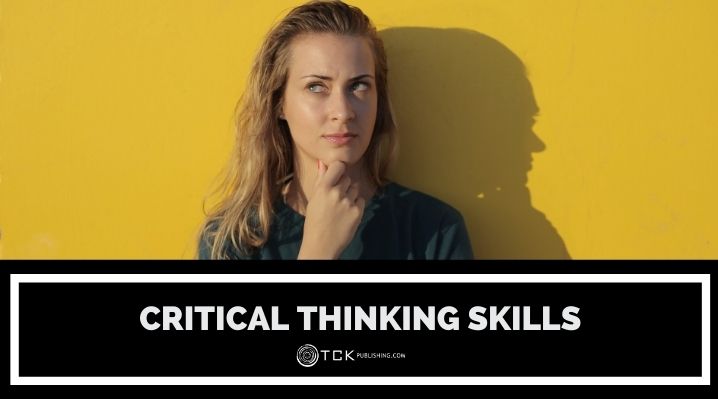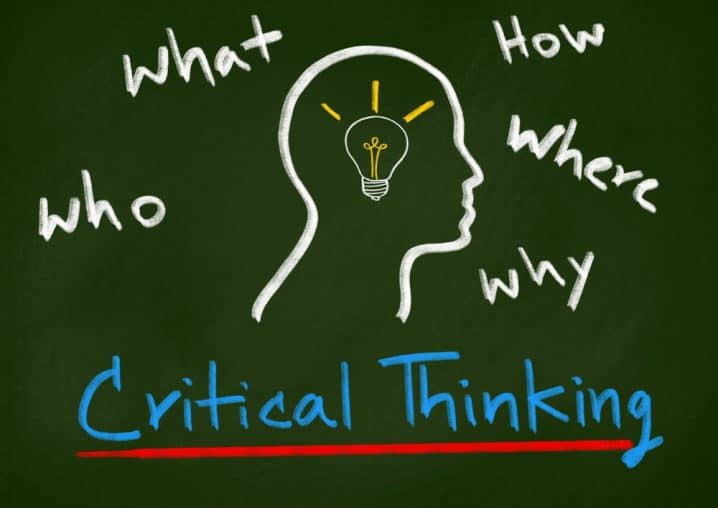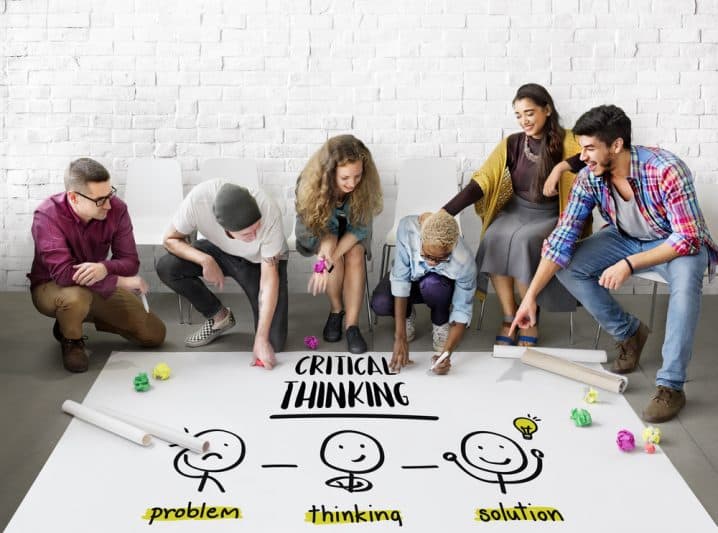
Critical thinking skills allow us to process and understand information, then draw our own conclusions based on the available facts. That might seem like a pretty simple task, but in this Information Age often characterized by misinformation, it can be very hard to tell fact from fiction,
Critical thinking can help you determine which facts you should consider in an argument, how to do effective research, and much more—but you first need to identify key critical thinking skills and learn how to develop them.
What Is Critical Thinking?
Critical thinking is the ability to find, understand, and build connections between different ideas. It requires an ability to reason, and also question the information you consume, rather than just passively listen and absorb it.
In other words, critical thinking requires a deeper analysis than just surface-level comprehension. In addition to understanding “what,” “when,” or “where,” you should seek to understand the “how” or “why” behind an idea.
Ideally, this type of thinking is done objectively, meaning you’re able to draw your own conclusions without being influenced by your biases or the opinions of others. You don’t just accept as fact the first thing anyone tells you.
How Do You Develop Critical Thinking Skills?
There are several key critical thinking skills that can make you a more informed decision-maker and a better analyst. Let’s look at each skill below, along with tips that can help you build and improve those skills:
1. Observation

The first step to critical thinking is to observe and identify key details. Learn to observe situations and identify problems yourself, so you don’t have to rely on others describing the problem for you.
By being more observational, you can also learn to predict future problems, since you’ll have a better understanding of the situations that lead to them. interrogative
How to Improve
- Take inventory. Ask yourself: Who is doing what? What do I know about their possible interests? What is the dominant tone in this conversation or situation? What was the result or outcome of this situation?
- Look for trends. Don’t ask these questions just once; it’s important to keep asking them in every situation, because the answers can help you identify patterns and trends, which may be indicative of something larger.
2. Research
Being able to conduct your own research is a very important skill, especially when it comes to comparing two sides of an argument.
Start by understanding that arguments are meant to be persuasive. You probably remember being taught to back up your claims with facts when writing your persuasive essays in school; but which facts did you use? All the facts, or the facts that supported your argument?
Don’t assume that the facts presented in an argument paint the full picture (or that they’re even facts at all). Learn how to conduct your own research and identify the most relevant facts so you can form your own opinions about an issue.
How to Improve
- Identify sources. Remember those observational questions we learned in #1? Make it a habit to ask them of sources. Ask yourself if the source might have any biases, and how those biases could impact the way they present information.
- Be wary of claims without sources. When someone makes a claim, ask them where they got their information. If they can’t tell you, you don’t necessarily need to discard that information, but you should keep this in mind when weighing the arguments.

3. Identifying Biases
It’s definitely not easy to identify biases, but the first step is to be aware that they exist, and that everyone has them. In fact, the hardest biases to identify are usually your own!
So since everyone has biases, identifying their presence is just the first step; you have to also ask yourself how those biases affect the way the information is being presented.
Challenge yourself to examine the evidence on both sides of the argument. Try to look objectively at your side, and ask yourself if the evidence really holds up. Are you looking at all of the evidence, or just the points that support your claims?
Also challenge yourself to consider the other side’s points, as objectively as you can. Remember the “counter-argument” paragraph your teachers had you write for persuasive essays? That was an early practice in critical thinking!
Looking at things from a different perspective will help you think critically, but it can also help you develop a stronger argument of your own if you’re able to address those counter-points.
How to Improve
- Ask yourself: Whom does this claim or argument benefit? Might the source have an agenda? What could that be?
- Look for holes. Is the source overlooking or ignoring any pieces of information that don’t support its claim? This might require extra research on your part, but that’s part of the process.
- Examine word choice. Is the source using unnecessary modifiers that take away from the objectivity of the writing? Could this be designed to sway audiences?
4. Determining Relevance
When looking at the information presented to you, assessing the relevance of each point is also important.
A piece of information might be true and accurate, but that doesn’t mean it’s relevant to the argument or case in question.
However, irrelevant details aren’t always obvious. In many cases, they’re craftily snuck into an argument to make it look like there is a lot of supporting evidence, when really the support that’s provided isn’t relevant to the main question. (You’ll see this trick used a lot during political debates!)
To get better at determining relevance, you should start with a clear idea of what you need to figure out and what your end goal looks like. Do you hope to arrive at a yes or no answer? Are you looking to see if there’s a trend or correlation?
Staying focused on a clear goal will help you weed out details that are not important to your evaluation, so you can focus on the ones that actually matter.
How to Improve
- Clarify your goals. Write down a clear objective. What exactly is the question you’re trying to answer, or problem you’re trying to solve?
- Prioritize information. Look at the list of facts or points you’ve been given, and try to prioritize them in order of relevance. Many of the details at the bottom can likely be ruled out, and you can focus your efforts on evaluating what falls in the middle.
5. Communication

Communication is an important skill for critical thinking because you need to be able to put your thoughts into words and find the information you need.
Also, you might not be doing your critical thinking alone, but in collaboration with others, which means you must be able to effectively describe often complex ideas and problems, and work out solutions together.
How to Improve
- Listen. Practice being a good listener so you can better understand the people you communicate with, as well as the points they might bring to an argument. If you’re only thinking about your own ideas and perspective while the other person is speaking, then you’re not really listening, and you could be missing important information.
- Stay calm and rational. Easier said than done sometimes, but this is important if you want to keep a level head and understand all sides of an argument, you need to try to stay calm and objective, and make sure that is evident in your communications with others.
6. Curiosity
As we get older, that curiosity with which he asked so many questions as young children tends to diminish. We become embarrassed about asking questions for fear of looking silly or dumb, and we don’t want to risk offending others with questions.
But curiosity is a big part of critical thinking, because those questions can lead to important insights about the facts being presented.
How to Improve
- Don’t hold back questions. Give yourself permission to ask questions without worrying about how they might make you sound. Practice asking open-ended questions (these usually begin with “why” or “how”).
- Make learning fun. Get excited about learning again! When you read something you don’t understand or come across something you’d like more information on, take the time to do
Critical Thinking Examples

Wondering what critical thinking looks like in practice? Here are some examples of critical thinking in action at work and in one’s personal life.
At work:
- A small business owner tries to anticipate the potential economic and human consequences of various plans to reduce costs.
- A job applicant chooses the most relevant work history details to include on her resume before submitting it.
- A writer creates an outline for their book and organizes her ideas to create a logical flow from one to the next, and determines which details are most relevant for each section.
- A crime scene investigator observes and connects the details of a scene to develop plausible hypotheses of what could have happened.
- A manager helps settle a dispute between colleagues by objectively suggesting alternatives that are fair to all parties involved.
At home:
- You observe your friend’s unusual bad mood and snide remarks, and instead of getting angry, ask thoughtful questions to figure out what’s really bugging them and how you can help.
- A parent sees their young child throwing a tantrum and, based on what they know about the child’s past behaviors, conclude that he needs a nap.
- A husband sees that his wife is upset, but instead of being quick to react negatively, he takes a look at her calendar and sees that she had a day full of difficult meetings, so he cooks her dinner.
- Parents anticipate the costs of their child’s college education and set their budget accordingly so they’ll have saved enough money when the time arrives.
Critical Thinking Questions
The following questions can be helpful for practicing your critical thinking skills and looking at things more analytically.
- Who is speaking/writing/acting?
- What is the main problem you’re trying to solve?
- Could the speaker or writer have an agenda other than what they’ve stated?
- Who would benefit from the proposed action or argument?
- Who opposes this argument and why might they oppose it?
- What is the other side of this argument?
- What would happen if…?
- What does the evidence say?
- What are the potential consequences of the plan?
- How does this work?
- How else might this be interpreted?
- Why did [x] happen?
Benefits of Critical Thinking
Critical thinking is important because it allows you to make your own decisions, without relying on others to interpret information for you.
This, in turn, will guide you to better and more thoughtful decisions that will lead to results you choose, not ones that someone else wants.
Did you find this post helpful? Let us know in the comments below!
If you enjoyed this post, then you might also like:
- Hasty Generalization: Definition, Examples, and How to Avoid this Fallacy in Your Writing
- How to Write a Literary Analysis: 6 Tips for the Perfect Essay
- How to Become a Journalist: 6 Tips for Aspiring Reporters
- How to Ace a Virtual Interview: 8 Tips for Making a Great First Impression Digitally
As a blog writer for TCK Publishing, Kaelyn loves crafting fun and helpful content for writers, readers, and creative minds alike. She has a degree in International Affairs with a minor in Italian Studies, but her true passion has always been writing. Working remotely allows her to do even more of the things she loves, like traveling, cooking, and spending time with her family.
